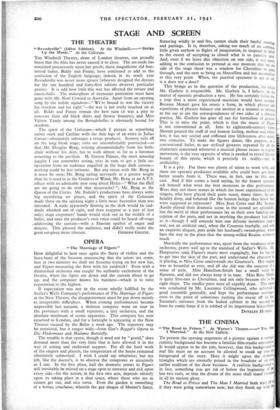OPERA
.4 The Marriage of Figaro "
How delightful to hear once again the flurry of violins and the buzz-buzz of the bassoon announcing that the actors are come, that in two minutes we shall see Susanna trying on her new hat, and Figaro measuring the floor with his yardstick! Even with a diminished orchestra one caught the authentic excitement of the theatre, when the lights are down and the curtain about to go up, and the composer knows his business—which is to raise expectation to the highest.
If expectation was not in the event wholly fulfilled by the Sadler's Wells Company's performance of The Marriage of Figaro at the New Theatre, the disappointment must be put down mainly to insuperable difficulties. When evening performances became impossible last autumn, a skeleton company went on tour in the provinces with a small repertory, a tiny orchestra, and the absolute minimum of scenic apparatus. This company has now returned to London, and for a fortnight is appearing at the New Theatre vacated by the Ballet a week ago. The repertory may be restricted, but it ranges wide—from Gay's Beggar's Opera to Die Fledermaus and Madame Butterfly.
The trouble is that opera, though it need not be " grand," does demand more than the very little that is here allowed it in the way of setting and orchestral support. For all the hard work of the singers and players, the temperature of the house remained obstinately subnormal. I wish I could say otherwise; but my job, like the doctor's, is to observe the symptoms as accurately as I can. In the first place, half the dramatic points in Figaro will inevitably be missed on a stage open to entrance and exit upon every side—for the action, in the first two acts, depends entirely upon its taking place in a shut space, where those who are in cannot get out, and vice versa. Even the garden is something of a hortus conclusus, wherein the gay images of Mozart's fancy,
fluttering wildly to and fro, cannot elude their fateful meetings and partings. It is, therefore, asking too much of an audience, little given anyhow to flights of imagination, to suspend its belief to the extent of accepting as closed what is so patently open And, even if we leave this objection on one side, it was surely adding to the confusion to pretend at one moment that on ene side of the stage there- was a window for Cherubino to jump through, and the next to bring on Marcellina and her accomplices at this very point. When, the puzzled spectator is apt to ask, is a door not a door?
This brings us to the question of the production, for which Mr. Guthrie is responsible. Mr. Guthrie is, I believe, in the matter of operatic production a tyro. He has certainly fallen into a trap that a more experienced musician would have avoided, Because Mozart gave his music a form, in which phrases and repetitions of phrases balance one another in a manner as obvious to the ear as are the correspondences of two sides of a classical portico, Mr. Guthrie has gone all out for formalism of gesture, This is to miss the point, which is that the music of Figaro is not conventional at all. Into its eighteenth-century forms Mozart poured the stuff of real human feeling, molten and white- hot; it has not cooled and stiffened into lifelessness after near:, two centuries. To make the figures dance, like puppets, in 3 conventional ballet, to use stylised gestures repeated by all the characters concerned whenever a musical phrase recurs in a given movement, is the very opposite of what is needed to reveal the reel beauty of this opera, which is precisely its reality—not artificiality.
It is a pity. For there was plenty of talent to work with, and there are operatic producers available who could have got made better results from it. There was, in fact, one in this same cast. And if this seems a hard saying, let the honest spectate: ask himself what were the best moments in this performance. Were they not those scenes in which the more experienced of the singers, who have played their parts many, many times, let an,- ficiality drop, and behaved like the human beings they knew they were supposed to represent? Miss Joan Cross and Mr. Sumner Austin played their dramatic scene in the second act splendidls but the merit of their performance lay in their own familiar con- ception of the parts, and not in anything the producer had done to it—though I will concede him. one delicate invention (and real, not an artificial one), when the Countess fearfully, and with an exquisite disgust, puts aside her husband's sword-point, whic'e bars the way to the place that the strong-willed Rosina wishes cc
reach. .
Musically the performance was, apart from the weakness of the orchestra, pretty well up to the standard of Sadler's Wells. MI. Hargreaves sang Figaro's music most engagingly, but he has yet to get into the skin of the part, and understand the character he is playing, as Miss Cross understands the Countess's. Her singing was as beautiful as ever, and all she did was the outcome of 1 sense of style. Miss Hamilton-Smith has a small voice to Susanna, and did not always keep it in tune. Miss Rose Morris is quite first-rate as Cherubino, and not only because she is the right shape. The smaller parts were all capably done. The open was conducted by Mr. Laurance Collingwood, who achieved good ensemble generally, and kept the performance moving- even to the point of sometimes rushing the music off its fees. Susanna's entrance from the locked cabinet in the second as loses its comic force if it is robbed of its impertinent leisurelines DYNELEY Hussy/.






























 Previous page
Previous page